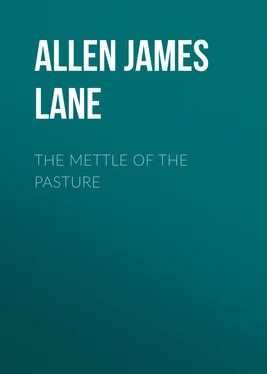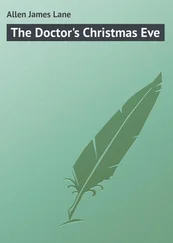James Allen - The Mettle of the Pasture
Здесь есть возможность читать онлайн «James Allen - The Mettle of the Pasture» — ознакомительный отрывок электронной книги совершенно бесплатно, а после прочтения отрывка купить полную версию. В некоторых случаях можно слушать аудио, скачать через торрент в формате fb2 и присутствует краткое содержание. Жанр: foreign_prose, foreign_antique, на английском языке. Описание произведения, (предисловие) а так же отзывы посетителей доступны на портале библиотеки ЛибКат.
- Название:The Mettle of the Pasture
- Автор:
- Жанр:
- Год:неизвестен
- ISBN:нет данных
- Рейтинг книги:4 / 5. Голосов: 1
-
Избранное:Добавить в избранное
- Отзывы:
-
Ваша оценка:
- 80
- 1
- 2
- 3
- 4
- 5
The Mettle of the Pasture: краткое содержание, описание и аннотация
Предлагаем к чтению аннотацию, описание, краткое содержание или предисловие (зависит от того, что написал сам автор книги «The Mettle of the Pasture»). Если вы не нашли необходимую информацию о книге — напишите в комментариях, мы постараемся отыскать её.
The Mettle of the Pasture — читать онлайн ознакомительный отрывок
Ниже представлен текст книги, разбитый по страницам. Система сохранения места последней прочитанной страницы, позволяет с удобством читать онлайн бесплатно книгу «The Mettle of the Pasture», без необходимости каждый раз заново искать на чём Вы остановились. Поставьте закладку, и сможете в любой момент перейти на страницу, на которой закончили чтение.
Интервал:
Закладка:
She had risen and advanced to the edge of the veranda.
"Did you come to see me or did you come to see my flowers?" she called out charmingly.
"I came to see the flowers, madam," he called back. "Most of all, the century plant: how is she?"
She laughed delightedly: "Still harping on my age, I see."
"Still harping, but harping your praises. Century plants are not necessarily old: they are all young at the beginning! I merely meant you'd be blooming at a hundred."
"You are a sly old fox," she retorted with a spirit. "You give a woman a dig on her age and then try to make her think it a compliment."
"I gave myself a dig that time: the remark had to be excavated," he said aloud but as though confidentially to himself. Open disrespect marked his speech and manner with her always; and sooner or later she exacted full punishment.
Meantime he had reached the steps. There he stopped and taking off his straw hat looked up and shook it reproachfully at the heavens.
"What a night, what a night!" he exclaimed. "And what an injustice to a man wading up to his knees in life's winters."
"How do you do," she said impatiently, always finding it hard to put up with his lingerings and delays. "Are you coming in?"
"Thank you, I believe I am. But no, wait. I'll not come in until I have made a speech. It never occurred to me before and it will never again. It's now or never.
"The life of man should last a single year. He should have one spring for birth and childhood, for play and growth, for the ending of his dreams and the beginning of his love. One summer for strife and toil and passion. One autumn in which to gather the fruits of his deeds and to live upon them, be they sweet or bitter. One winter in which to come to an end and wrap himself with resignation in the snows of nature. Thus he should never know the pain of seeing spring return when there was nothing within himself to bud or be sown. Summer would never rage and he have no conflicts nor passions. Autumn would not pass and he with idle hands neither give nor gather. And winter should not end without extinguishing his tormenting fires, and leaving him the peace of eternal cold."
"Really," she cried, "I have never heard anything as fine as that since I used to write compositions at boarding-school."
"It may be part of one of mine!" he replied. "We forget ourselves, you know, and then we think we are original."
"Second childhood," she suggested. "Are you really coming in?"
"I am, madam," he replied. "And guided by your suggestion, I come as a second child."
When he had reached the top step, he laid his hat and cane on the porch and took her hands in his—pressing them abstemiously.
"Excuse me if I do not press harder," he said, lowering his voice as though he fancied they might be overheard. "I know you are sensitive in these little matters; but while I dislike to appear lukewarm, really, you know it is too late to be ardent," and he looked at her ardently.
She twisted her fingers out of his with coy shame.
"What an old fox," she repeated gayly.
"Well, you know what goes with the fox—the foxess, or the foxina."
She had placed his chair not quite beside hers yet designedly near, where the light of the chandelier in the hall would fall out upon him and passers could see that he was there: she liked to have him appear devoted. For his part he was too little devoted to care whether he sat far or near, in front or behind. As the light streamed out upon him, it illumined his noble head of soft, silvery hair, which fell over his ears and forehead, forgotten and disordered, like a romping boy's. His complexion was ruddy—too ruddy with high living; his clean-shaven face beautiful with candor, gayety, and sweetness; and his eyes, the eyes of a kind heart—saddened. He had on a big loose shirt collar such as men wore in Thackeray's time and a snow-white lawn tie. In the bosom of his broad-pleated shirt, made glossy with paraffin starch, there was set an old-fashioned cluster-diamond stud—so enormous that it looked like a large family of young diamonds in a golden nest.
As he took his seat, he planted his big gold-headed ebony cane between his knees, put his hat on the head of his cane, gave it a twirl, and looking over sidewise at her, smiled with an equal mixture of real liking and settled abhorrence.
For a good many years these two had been—not friends: she was incapable of so true a passion; he was too capable to misapply it so unerringly. Their association had assumed the character of one of those belated intimacies, which sometimes spring up in the lives of aged men and women when each wants companionship but has been left companionless.
Time was when he could not have believed that any tie whatsoever would ever exist between them. Her first husband had been his first law partner; and from what he had been forced to observe concerning his partner's fireside wretchedness during his few years of married life, he had learned to fear and to hate her. With his quick temper and honest way he made no pretence of hiding his feeling—declined her invitations—cut her openly in society—and said why. When his partner died, not killed indeed but broken-spirited, he spoke his mind on the subject more publicly and plainly still.
She brewed the poison of revenge and waited.
A year or two later when his engagement was announced her opportunity came. In a single day it was done—so quietly, so perfectly, that no one knew by whom. Scandal was set running—Scandal, which no pursuing messengers of truth and justice can ever overtake and drag backward along its path. His engagement was broken; she whom he was to wed in time married one of his friends; and for years his own life all but went to pieces.
Time is naught, existence a span. One evening when she was old Mrs. Conyers, and he old Judge Morris, she sixty and he sixty-five, they met at an evening party. In all those years he had never spoken to her, nurturing his original dislike and rather suspecting that it was she who had so ruined him. But on this night there had been a great supper and with him a great supper was a great weakness: there had been wine, and wine was not a weakness at all, but a glass merely made him more than happy, more than kind. Soon after supper therefore he was strolling through the emptied rooms in a rather lonesome way, his face like a red moon in a fog, beseeching only that it might shed its rays impartially on any approachable darkness.
Men with wives and children can well afford to turn hard cold faces to the outside world: the warmth and tenderness of which they are capable they can exercise within their own restricted enclosures. No doubt some of them consciously enjoy the contrast in their two selves—the one as seen abroad and the other as understood at home. But a wifeless, childless man—wandering at large on the heart's bleak common—has much the same reason to smile on all that he has to smile on any: there is no domestic enclosure for him: his affections must embrace humanity.
As he strolled through the rooms, then, in his appealing way, seeking whom he could attach himself to, he came upon her seated in a doorway connecting two rooms. She sat alone on a short sofa, possibly by design, her train so arranged that he must step over it if he advanced—the only being in the world that he hated. In the embarrassment of turning his back upon her or of trampling her train, he hesitated; smiling with lowered eyelids she motioned him to a seat by her side.
"What a vivacious, agreeable old woman," he soliloquized with enthusiasm as he was driven home that night, sitting in the middle of the carriage cushions with one arm swung impartially through the strap on each side. "And she has invited me to Sunday evening supper. Me!—after all these years—in that house! I'll not go."
Читать дальшеИнтервал:
Закладка:
Похожие книги на «The Mettle of the Pasture»
Представляем Вашему вниманию похожие книги на «The Mettle of the Pasture» списком для выбора. Мы отобрали схожую по названию и смыслу литературу в надежде предоставить читателям больше вариантов отыскать новые, интересные, ещё непрочитанные произведения.
Обсуждение, отзывы о книге «The Mettle of the Pasture» и просто собственные мнения читателей. Оставьте ваши комментарии, напишите, что Вы думаете о произведении, его смысле или главных героях. Укажите что конкретно понравилось, а что нет, и почему Вы так считаете.












